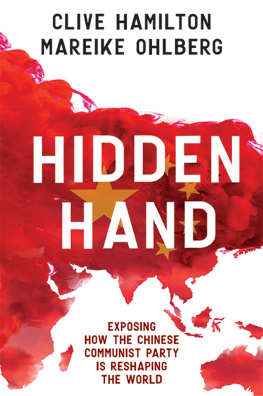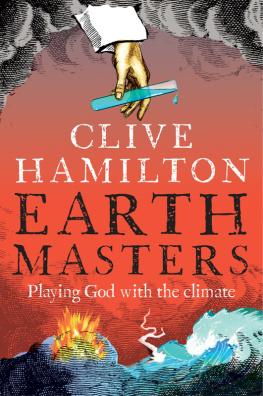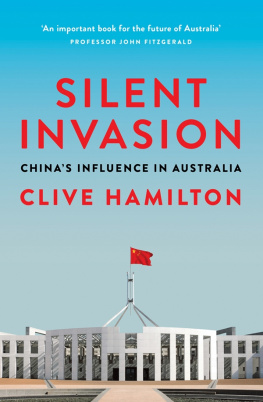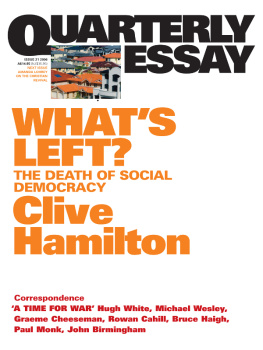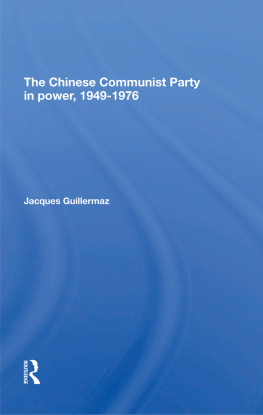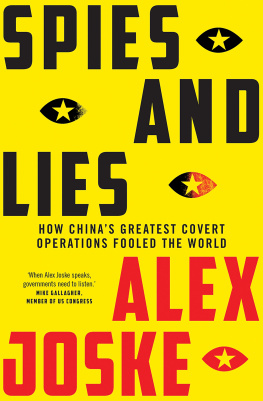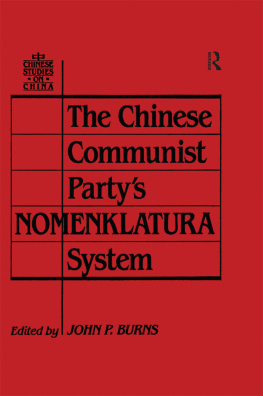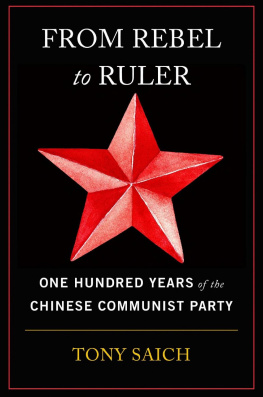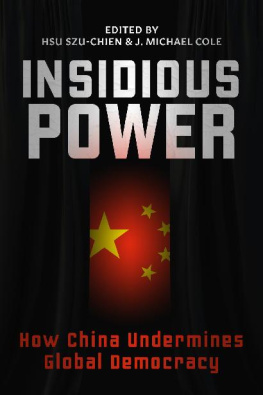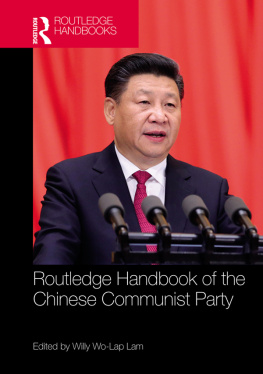
How should the West respond to these threats to individual freedom and human rights? How are democracies to become more resilient? How can they better equip themselves to deal with interference by the CCP and other authoritarian regimes without coming to resemble them?
An active pushback strategy is required, not mere talk or wishful thinking. Democracies wont be able to change China, but they can defend their most important institutions. Effective responses will differ from country to country, but all must draw on the strengths of open societies while simultaneously addressing their weaknesses. Countries will be required to accept the short-term costs that will come with the end of unrestrained engagement with China. And better coordination among allies is vital.
The CCP prefers to operate in the shadows, and sunlight is often the best disinfectant. The responsibility for shedding light on the Partys activities lies with the news media, government agencies, scholars and political leaders. Of these, the media ought to be at the forefront. Free speech and a free media are the enemies of the Chinese Communist Party and must be protected at all costs. Tantrum diplomacy and fear of economic retribution must not be allowed to prevent governments and others from calling out Beijing for its interference activities.
Scholars, too, must step up, because the very idea of the university is under threat. Attacks on academic freedom, whether in the form of insidious self-censorship or institutions leaning on employees to temper their work, need to be called out vigorously. Remaining silent when acts of interference, censorship and harassment occur is the greatest danger. There ought to be zero tolerance from academics and students. If enough universities invited the Dalai Lama to speak, Beijings threats would prove hollow.
Civil society also has a leading role to play in exposing the CCP. Political, business and university elites who acquiesce to or actively support Beijing deserve public scrutiny and robust criticism. Theatres, filmmakers, publishersall cultural organisations in factshould be exposed and condemned whenever they censor material under pressure from Beijing. Boycotts are often effective.
People of Chinese heritage have a vital role in the pushback against the CCP. It cannot be emphasised too strongly that the Chinese diaspora must be engaged, not least to neutralise the underhanded accusation that resistance to CCP influence is motivated by racism, or is somehow anti-China. Chinese-heritage people in the West, and elsewhere, are the foremost targets of CCP intimidation. The threat to conform to Beijings wishes or be punished is often severe. The rights of these people need protection; those among them willing to speak out must be supported, and those who threaten them should be prosecuted.
The language used in the pushback should never fall into the trap of conflating the CCP with the Chinese people. More people of Chinese heritage who are committed to democracy need to be involved in civic and political organisations, in order to counter the CCPs huaren canzhang program of promoting its own people. Political parties should be encouraging ethnic Chinese people with democratic values to run for office, and politicians must stop legitimising united front groups by associating with them.
The defence of democratic institutions rests with political parties, public service agencies, law enforcement, universities, cultural institutions, media organisations and businesses, all of which need to define and enforce clear rules for dealing with authoritarian regimes. In the political domain, much can be achieved by legislating for transparency in lobbying and by fixing loopholes in campaign-financing laws, thus preventing CCP proxies from buying political influence with donations, backing their favoured candidates, suppressing critical voices, and engaging in information campaigns to swing elections. Parliaments must also enact foreign interference laws where needed, to protect against new forms of political warfare and to defend against organisations and individuals that actively seek to subvert democratic institutions. Another weakness that urgently needs to be addressed is the underfunding of universities, many of which are now led by profit-oriented people who believe their success depends on good relations with Beijing. Academic freedom is more difficult to uphold when doing so risks financial punishment. Universities need more money to fund independent experts on China who will help the public understand the CCPs strategies.
Similarly, greater investment in public media will help counter those proprietors who have a financial interest in staying on Beijings good side. Measures to expose and disable CCP control of Chinese-language media should include overcoming advertiser boycotts, which have driven many from the market. New companies may need public financial support.
The costs entailed in a nation reducing its vulnerability to CCP pressure will be worth it in the long run. Beijing wields its economic power like a great weapon. Its economic blackmail has proven highly effective, distorting decisions made by elected governments, frightening bureaucrats, silencing critics, and making countless companies beholden to it. That power is only amplified when Chinese companies answerable to Beijing own critical infrastructure in other countries. The West needs to inoculate itself against these pressures where it can, but where it cant it needs to make some hard choices and walk away.
All industries, including the education and tourism sectors, must understand the political risks of becoming heavily reliant on revenue flows from China. Short-term profit-making exposes them to long-term damage. When considering partnerships with Chinese organisations, much better due diligence is required, by people who are fluent in Chinese and have a strong understanding of how the CCP system works.
Governments need to make it clear that all companies that expose themselves to risk by becoming too dependent on Chinas market must bear the costs. Companies should not expect their governments to compromise human rights and civil freedoms to appease Beijing. As long as the current CCP regime rules China, prudent corporate management requires diversification of markets.
The United States cannot succeed in countering the CCPs spreading influence alone. By going it alone, it is playing into Beijings hands. At the same time, other Western nations need to realise that a CCP-led China is not and never will be its friend. Other than those it controls, Beijing abhors alliances and does all it can to break them up. Democratic nations around the world must unite to protect universal human rights and democratic principles, and in this endeavour, alliances with developing nations will be as important as those among developed nations.
Despite the grim picture painted in this book, we remain hopeful that democracy and the will to freedom can prevail. In Hong Kong and Taiwan, people are fighting back against the CCPs attempts to control and intimidate them. Its true that many in the West are beset by cynicism and exhaustion when it comes to their own governance systems, yet more and more can see that the CCP represents a profound threat to the rights and freedoms that are frequently taken for granted. And it is reassuring to note that opposition to the CCPs influence, interference and intimidation crosses traditional political boundaries. People on the left and on the right who have opened their eyes to the threat posed by the CCP, including those who have left China to escape it, are banding together. The pushback is growing by the day and the Party bosses in Beijing are worried.
Next page
